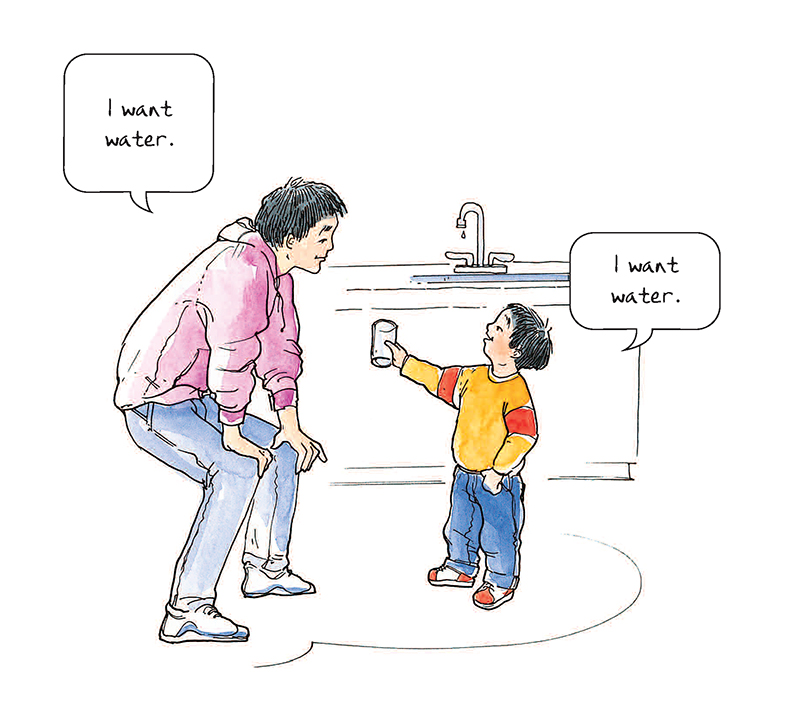
What is Echolalia?

While at first glance children with echolalia may seem to use vocabulary beyond their years, it soon becomes apparent that they do not completely understand what they are saying. For example, a child may be able to sing a “grown up” song word-for-word, but he cannot ask for juice that he needs or follow simple two-step commands. To put it simply, the child can repeat certain words without knowing how to apply, interpret, or use them.
What is the Link Between Echolalia and Autism?
Echolalia is a condition that may occur concurrently with autism. Research shows that nearly 85-percent of children with autism demonstrate some type of echolalia. The bright side of this condition is that it may be a sign that children with autism may become verbal, respond positively to speech therapy, and start expressing themselves effectively with spoken language.
It is important to note that in several ways, echolalia can be a normal part of language development. Children usually begin emulating speech at around 18 months, and this practice generally peaks at around 30 months old. The practice then falls out of use by the time a child turns 3 years old. At this stage, children begin to become conversations by asking questions, responding to requests, and formulating thoughts of their own.
In verbal children with autism, however, echolalia can occur more frequently and last beyond the 30-month period of other children. The condition may show up as a repetitive behavior (such as spontaneously quoting lines from a movie several times a day), and the context of the verbiage may appear to have nothing to do with the current subject at hand. Moreover, echolalia may not just include the words themselves, but also an exact imitation of the voice the child heard at the time.
What are the Different Types of Echolalia?
There are two primary types of echolalia: immediate echolalia and delayed echolalia.
Immediate Echolalia:
Refers to when a child repeats words or phrases very quickly after first hearing them. For example, a child may immediately repeat a question (“Do you want some milk?”) instead of responding with the appropriate reply (“Yes” or “No”).
In addition to parroting of an entire phrase, some children may immediately repeat the last few words of a sentence to indicate their answer. Professionals suggest that this may be a way of lowering anxiety or “buying time” to process the question before providing their answer.
Delayed Echolalia:
Refers to when a child echoes words or phrases long after first hearing them. The delay can last hours, weeks, or even months after the child first hears the word or phrase, making it seem far out of context when the imitation occurs. For example, a child with delayed echolalia may begin to sing “Happy Birthday” to every person who enters a room (after having picked up the song from a birthday party attended months before).
How to Interact With Children with Echolalia
Although the condition may startle or confuse parents and caregivers initially, there are beneficial tips for interacting with children with this condition.
- Model language from the child’s point of view. Instead of asking “Do you want juice?”, model the phrase by handing the juice box to the child and demonstrating, “Sarah wants the juice.” If the child does not want the object, model this as well (“Sarah does not want the juice, but Lisa does.”) Doing so can help children learn applicable language in context.
- Be consistent with your style of language. Keep facial expressions and gestures simple and clear so that the child can learn to adapt at their own pace (For example, avoid sarcasm and be willing to explain humor and figurative speech).
- As a child’s language advances, ask questions and offer the responses at the end. For example, “Do you want juice, yes or no?” This can help the child begin to process and connect questions with responses. Similarly, you can use options and choices with questions: “Do you want bananas or strawberries?”
- When giving options, hold up the objects and let the child indicate his or her answer by repeating the object name. Doing so can help the child associate a modeled phrase with an applicable answer. Be sure to watch your tone to avoid leading questions as there is no “right” answer.
- Model or demonstrate a response so that the child learns how to make a request. For example, instead of asking, “Do you want help?” You can use the word “help” while performing the action. This can help children learn to use the word or phrase when requesting help in the future.
- Respond the requests with variation. In other words, avoid simply saying “Okay” in response to every request. Practicing variation (“Sure!” “Let’s do it together” or a non-verbal response) can help children begin to adapt appropriate fluctuations in responses.
- For some children, echolalia may be a way to self-soothe in response to extremes. In other words, a child may use repetitive behaviors when overstimulated/overwhelmed or when bored/tired. Learn to assess the situation for environmental factors. You can then use the echolalia as an opportunity to model or teach responses. In this way, children can begin to see language as a solution to current predicaments rather than a challenge or burden to overcome.
For additional resources to help children with echolalia, contact The Warren Center for more information on strategies and treatment plans.


